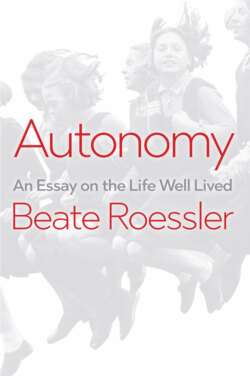Читать книгу Autonomy - Beate Roessler - Страница 10
Notes
Оглавление1 1 I am not referring here, however, to the paradox of autonomy allegedly found in Kant, which argues that the ideal of autonomy itself cannot even be articulated without contradiction. I will return to this below. See Thomas Khurana, “Paradoxes of Autonomy: On the Dialectics of Freedom and Normativity,” Symposium 17(1) (2013): 50‒74. For a critique of this presumed paradox, see also Pauline Kleingeld and Markus Willaschek, “Autonomy without Paradox: Kant, Self-Legislation and the Moral Law,” Philosophers’ Imprint 19(6) (2019): 1‒18.
2 2 I learned a great deal about Murdoch’s work from A. S. Byatt’s book Degrees of Freedom: The Early Novels of Iris Murdoch (New York: Vintage, 1994).
3 3 Iris Murdoch, Nuns and Soldiers (New York: Penguin, 2002), 352.
4 4 Quoted in Cheryl K. Bove, Understanding Iris Murdoch (Columbia: University of South Carolina Press, 1993), 194.
5 5 Iris Murdoch, A Word Child (London: Chatto & Windus, 1975), 221. Cf. ibid., 126.
6 6 Jonathan Lear, “The Freudian Sabbath,” in Rachel Zuckert and James Kreines (eds), Hegel on Philosophy in History (Cambridge: Cambridge University Press, 2016), 230‒47 (235).
7 7 Iris Murdoch, The Flight from the Enchanter (London: Chatto & Windus, 1956), 246f.
8 8 Samir Frangieh, “The Arab Revolts and the Rise of Personal Autonomy” (interview), Resetdoc, August 20, 2014, http://www.resetdoc.org/story/00000022438
9 9 For a different view, cf. Susan Wolf, Meaning in Life and Why It Matters (Princeton: Princeton University Press, 2010), 3. Wolf differentiates between the meaningful, the happy, and the moral life, a distinction to which I will return repeatedly below.
